1. ANGELS AND SAINTS AT EPHESUS, Benedictines of Mary, Queen of Apostles (Decca)— The Benedictines of Mary, Queen of Apostles, are a young (founded in 1995) monastic order of sisters who sing together eight times a day as they chant the Divine Office in Latin. Late last year they found themselves collectively topping the Billboard Classical charts for more than a month with their Advent at Ephesus CD (which, in a bit of delicious irony, bumped the companion CD to the erotic novel Fifty Shades of Grey from the top spot). Released on May 7, a new CD, Angels and Saints at Ephesus, recorded in the acoustically sound environs of the sisters’ priory in Gower, Missouri, under the aegis of nine-time Grammy winning producer Christopher Alder and two-time Grammy-winning engineer Mark Donahue, is another otherworldly, meditative journey into the music that shapes the lives and spirituality of the Benedictines of Mary—“musically, it is our daily bread,” said Sister Scholastica Radel, Sub Prioress, Benedictines of Mary, in an exclusive interview via email with Deep Roots. The new disc—the sisters’ fourth–features 17 selections sung in English and Latin, all associated with the feasts of holy saints and angels. It’s not all early music, however—this album includes a new original song, “A Rose Unpetalled,” by Mother Cecilia (it is credited collectively, to the Benedictines of Mary). Follow this link to the album review and exclusive Deep Roots interview with Sister Scholastica Radel, Sub Prioress, Benedictines of Mary.
From Angels and Saints at Ephesus, Benedictines of Mary, Queen of Apostles offer ‘O Deus Ego Amo Te (Prayer of St. Francis Xavier)’
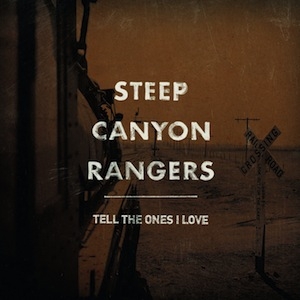 2. TELL THE ONES I LOVE, Steep Canyon Rangers (Rounder)—In a recent online interview to promote an upcoming concert the Steep Canyon Rangers’ formidable guitarist/tenor singer Woody Platt said the band, though honored “to be part of the current bluegrass scene,” will have nothing to do with resting on its laurels: “We are constantly striving to grow, create and maximize our potential. Firing on all cylinders—that is always the goal.” No better embodiment of Platt’s Maxim exists than the Rangers’ latest long player, the Larry Campbell-produced Tell the Ones I Love. Talk about striving to grow: ace guitarist Campbell, a mainstay of Levon Helm’s Dirt Farmer Band and three-time Grammy winning producer, steered the recording at Levon’s studio in Woodstock, NY, and steered the band into its most captivating sonic turf in response to the finest batch of songs group members Graham Sharp (banjo) and Charles R. Humphrey III (bass) have yet delivered. The sound is warm and close to the earth—not earthy, which may be a fine distinction but is a distinction nonetheless—the better to embrace double-edged narratives of a darker hue than Rangers fans may have expected. “Come Dance” (a Sharp co-write with the Rangers’ dazzling fiddler Nicky Sanders), for instance, opens with scenes of, first, an empty ballroom awaiting dancers, a place “where the love that you give comes back sevenfold,” and “a bright clear blue sky without end/where the warmth of the sun falls soft on your skin/and the air is as pure as the song in your soul,” all leading to the beckoning chorus of “come dance, dance here with me/set yourself free, come dance…” Despite the joyous, high flying melody and buoyant harmonies, an undercurrent of melancholy attends the chorus in its gentle plea to “set yourself free,” suggesting some resistance to the singer’s advances, no matter the spiritual intensity of the experience he promises. This is about as perfect a cut as the Rangers have ever delivered, and they’ve delivered a bunch: the precision playing and the interaction between instruments, the sheer soulfulness of it all, the punch of the dramatic instrumental accents between verses, and finally, Platt’s nuanced lead vocal and the sheer beauty of the harmonizing—this amounts to a positively breathtaking experience. The kicker is that the band does this on cut after cut, from the jubilant title track that opens the album—both a rumbling train song and a bristling farewell from someone escaping a life of woes in search of sunnier emotional climes, a restlessness strikingly evoked by Nicky Sanders’s anxious fiddle soloing—to Sharp’s easygoing, fiddle-fired closer, “Las Vegas,” the bluesy, weary testimony of a fellow finding his spirit being steadily eroded by the surreal world of modern-day Sin City, a state of affairs Sharp emphasizes in his dry, wry vocal. Heartbreak is deftly, piercingly explored in the tear-stained blues ballad “Bluer Words Were Never Spoken” (a Humphrey III co-write with Jonathan Byrd), with its western-tinged atmospherics courtesy Campbell’s soft, crying pedal steel, Sanders’s moaning fiddle, Mike Guggino’s spare mandolin embellishments and the tight, keening harmonizing in the choruses; ambition and fresh starts in the urgency of “Boomtown”; and love of the fiercest, most devoted kind in the hard charging “Lay Myself Down.” It’s the Steep Canyon Rangers in full, in which condition these gents are virtually without peer among American bands in any genre.
2. TELL THE ONES I LOVE, Steep Canyon Rangers (Rounder)—In a recent online interview to promote an upcoming concert the Steep Canyon Rangers’ formidable guitarist/tenor singer Woody Platt said the band, though honored “to be part of the current bluegrass scene,” will have nothing to do with resting on its laurels: “We are constantly striving to grow, create and maximize our potential. Firing on all cylinders—that is always the goal.” No better embodiment of Platt’s Maxim exists than the Rangers’ latest long player, the Larry Campbell-produced Tell the Ones I Love. Talk about striving to grow: ace guitarist Campbell, a mainstay of Levon Helm’s Dirt Farmer Band and three-time Grammy winning producer, steered the recording at Levon’s studio in Woodstock, NY, and steered the band into its most captivating sonic turf in response to the finest batch of songs group members Graham Sharp (banjo) and Charles R. Humphrey III (bass) have yet delivered. The sound is warm and close to the earth—not earthy, which may be a fine distinction but is a distinction nonetheless—the better to embrace double-edged narratives of a darker hue than Rangers fans may have expected. “Come Dance” (a Sharp co-write with the Rangers’ dazzling fiddler Nicky Sanders), for instance, opens with scenes of, first, an empty ballroom awaiting dancers, a place “where the love that you give comes back sevenfold,” and “a bright clear blue sky without end/where the warmth of the sun falls soft on your skin/and the air is as pure as the song in your soul,” all leading to the beckoning chorus of “come dance, dance here with me/set yourself free, come dance…” Despite the joyous, high flying melody and buoyant harmonies, an undercurrent of melancholy attends the chorus in its gentle plea to “set yourself free,” suggesting some resistance to the singer’s advances, no matter the spiritual intensity of the experience he promises. This is about as perfect a cut as the Rangers have ever delivered, and they’ve delivered a bunch: the precision playing and the interaction between instruments, the sheer soulfulness of it all, the punch of the dramatic instrumental accents between verses, and finally, Platt’s nuanced lead vocal and the sheer beauty of the harmonizing—this amounts to a positively breathtaking experience. The kicker is that the band does this on cut after cut, from the jubilant title track that opens the album—both a rumbling train song and a bristling farewell from someone escaping a life of woes in search of sunnier emotional climes, a restlessness strikingly evoked by Nicky Sanders’s anxious fiddle soloing—to Sharp’s easygoing, fiddle-fired closer, “Las Vegas,” the bluesy, weary testimony of a fellow finding his spirit being steadily eroded by the surreal world of modern-day Sin City, a state of affairs Sharp emphasizes in his dry, wry vocal. Heartbreak is deftly, piercingly explored in the tear-stained blues ballad “Bluer Words Were Never Spoken” (a Humphrey III co-write with Jonathan Byrd), with its western-tinged atmospherics courtesy Campbell’s soft, crying pedal steel, Sanders’s moaning fiddle, Mike Guggino’s spare mandolin embellishments and the tight, keening harmonizing in the choruses; ambition and fresh starts in the urgency of “Boomtown”; and love of the fiercest, most devoted kind in the hard charging “Lay Myself Down.” It’s the Steep Canyon Rangers in full, in which condition these gents are virtually without peer among American bands in any genre.
The Steep Canyon Rangers crash their friends’ wedding and perform ‘Come Dance’ from the Larry Campbell-produced album Tell the Ones I Love.
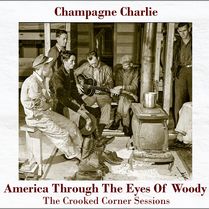 3. AMERICA THROUGH THE EYES OF WOODY, Champagne Charlie (www.champagnecharlie.nl) The songs of Woody Guthrie have, sadly in some cases, never been more relevant than in these new hard times when more people have been robbed by fountain pens than by six-guns and income inequality has made more Americans feel a kinship to the Dust Bowl migrants that inspired many of Woody’s most powerful and enduring stanzas. Woody was far from the only songwriter inspired to chronicle the tribulations of common folk or to muse in song about social issues confronting America during the Depression years and beyond, as no band has better chronicled than those aces from the Dutch Delta known as Champagne Charlie. America Through the Eyes of Woody is neither anomaly nor opportunism incarnate; it is, in fact, CC’s third album since 2009’s brilliant Waitin’ On Roosevelt—a trove of Depression-era blues, old-timey and folk songs, many so obscure as to have been completely forgotten, specifically referencing the presidency of Franklin Delano Roosevelt and/or the effect his administration’s policies were having on the populace at large—to flesh out what the band’s lead singer/songwriter Sjef Hermans described in this publication (in our previous incarnation as TheBluegrassSpecial.com) as “a soundtrack of the Depression.” The second album in the series was 2011’s Hobo Signs & Railroad Line (see a related feature and exclusive interview with Sjef Hermans in the September 2011 issue of TheBluegrassSpecial.com), a collection of 15 vintage songs about the migrant workers characterized as “gentlemen of the road” by Jeff Davis, King of the Hoboes, in his 1938 Hobo Yearbook and Reference Manual for the Hoboes of America.
3. AMERICA THROUGH THE EYES OF WOODY, Champagne Charlie (www.champagnecharlie.nl) The songs of Woody Guthrie have, sadly in some cases, never been more relevant than in these new hard times when more people have been robbed by fountain pens than by six-guns and income inequality has made more Americans feel a kinship to the Dust Bowl migrants that inspired many of Woody’s most powerful and enduring stanzas. Woody was far from the only songwriter inspired to chronicle the tribulations of common folk or to muse in song about social issues confronting America during the Depression years and beyond, as no band has better chronicled than those aces from the Dutch Delta known as Champagne Charlie. America Through the Eyes of Woody is neither anomaly nor opportunism incarnate; it is, in fact, CC’s third album since 2009’s brilliant Waitin’ On Roosevelt—a trove of Depression-era blues, old-timey and folk songs, many so obscure as to have been completely forgotten, specifically referencing the presidency of Franklin Delano Roosevelt and/or the effect his administration’s policies were having on the populace at large—to flesh out what the band’s lead singer/songwriter Sjef Hermans described in this publication (in our previous incarnation as TheBluegrassSpecial.com) as “a soundtrack of the Depression.” The second album in the series was 2011’s Hobo Signs & Railroad Line (see a related feature and exclusive interview with Sjef Hermans in the September 2011 issue of TheBluegrassSpecial.com), a collection of 15 vintage songs about the migrant workers characterized as “gentlemen of the road” by Jeff Davis, King of the Hoboes, in his 1938 Hobo Yearbook and Reference Manual for the Hoboes of America.
Once again, Champagne Charlie (Peer Bout, double bass, electric bass; Geert de Heer, mandolin; Peter Lenselink, drums, percussion; Sjef Hermans, lead vocals, acoustic guitar, banjo; Gait Klein Kromholf, harmonica; Theo de Koning, six- and 12-string guitars, banjo) has given us an American’s songs in a more robust and honest way than most of Woody’s many acolytes and imitators have mustered. Their musicianship is simply impeccable, and they play exactly what’s needed and no more—the intimate soundscapes and the close-miked vocals (mostly Hermans) seem designed to implore us to listen to Woody’s words in all their folk poetry and plainspoken wisdom. Their “Plane Wreck at Los Gatos (Deportee),” with Hermans’s sensitive vocal backed mostly by only acoustic guitar, with a lap steel flourish at the song’s start and a ripple of harmonica here and there, its stark ambience underscoring the tragic tale without undue theatrics or melodrama. Conversely, the way the band picks it up and goes on a sprightly reading of “Hard Travelin’,” Woody’s ode to the travails of the itinerate laborer, is positively uplifiting—Hermans swings the vocal with infectious enthusiasm, drops in a few tasty banjo solos, makes room for upbeat solos courtesy harmonica man Gait Klein Kromholf and mandolin master Geert de Heer, while throughout percussionist Peter Lenselink is clicking-clacking a rockabilly-like tempo behind it all. “What Are We Waitin’ On” Woody’s famous about-face about America’s intervention in WWII, is as stark as “Sixteen Tons,” with only handclaps, a somber thumping bass and the occasional harp blast supporting Hermans’s determined vocal delivery. The selections also include Woody’s wry, contrarian takes on “Billy the Kid” and “Pretty Boy Floyd” (the source of that “some will rob you with a six-gun/some with a fountain pen” truth); a hymn-like reading of the hosanna to the strength and resolve of the Dust Bowl migrants, “Pastures of Plenty”; a cheery, sea chanty-style rendition of “The Jolly Banker,” Woody’s satirical punch at an especially contemptible breed that inspired in him no small measure of enmity; and the logical closer, a straightforward, shuffling reading of “This Land Is Your Land” complete with the inflammatory verses that were until very recently excised in favor of making the song more palatable for popular consumption. As with the other two albums in CC’s “Songs of the Depression” series, America Through the Eyes of Woody includes an expertly annotated liner booklet, this one containing a succinct, thoroughly researched Woody biography and song-by-song commentary and history, by Will Kaufman of the University of Central Lancashire and author of Woody Guthrie, American Radical (2011). Thus the final grace note to another invaluable American history lesson from our Dutch friends, couched in inspired music and delivered with deep understanding of what’s at stake in each song. American Through the Eyes of Woody is available only at Champagne Charlie’s website, which is translated for English speaking visitors. Stay tuned to Deep Roots for another exclusive interview with Sjef Hermans in the near future.
AUDIO CLIP: Champagne Charlie, ‘Pastures of Plenty,’ from America Through the Eyes of Woody
 4. BROTHERS OF THE HIGHWAY, Dailey & Vincent (Rounder)–No beating around the bush here: when Jamie Dailey and Darrin Vincent return from their travels through the gospel world (2012’s The Gospel Side of Dailey & Vincent) and the Statler Brothers’ world (2010’s Dailey & Vincent Sing the Statler Brothers) and deliver a solid dozen traditional-styled gems of the sort that made them bluegrass superstars out of the box with their eponymous 2008 debut, well, it’s a big deal. Not that the duo was slumming on the aforementioned long players: The Gospel Side of Dailey & Vincent is a powerful, moving testimony of faith and impressive enough to rank as #18 in this publication’s Elite Half Hundred of 2012, a best-of ranking that includes albums from all the roots genre’s Deep Roots covers, including classical; and reminding listeners of the great songs the Statler Brothers left us upon their retirement seems a noble undertaking, regardless of its commercial viability. In a real sense, Brothers of the Highway is as much a concept album as the two preceding it. It may seem a disparate bunch of songs–a couple of strong Dailey originals mixed in with tunes from Bill Monroe, Wilma Lee Cooper, Vince Gill, the Louvins, Pete Goble and others–but in fact D&V might well have titled their new album The L Word–not, mind you, in referenced to the cable series centered on lesbian life, but rather for the album’s multiple themes of Living, Lovin’, Losin’ and Leavin’. Follow this link to the Deep Roots review of Brothers of the Highway.
4. BROTHERS OF THE HIGHWAY, Dailey & Vincent (Rounder)–No beating around the bush here: when Jamie Dailey and Darrin Vincent return from their travels through the gospel world (2012’s The Gospel Side of Dailey & Vincent) and the Statler Brothers’ world (2010’s Dailey & Vincent Sing the Statler Brothers) and deliver a solid dozen traditional-styled gems of the sort that made them bluegrass superstars out of the box with their eponymous 2008 debut, well, it’s a big deal. Not that the duo was slumming on the aforementioned long players: The Gospel Side of Dailey & Vincent is a powerful, moving testimony of faith and impressive enough to rank as #18 in this publication’s Elite Half Hundred of 2012, a best-of ranking that includes albums from all the roots genre’s Deep Roots covers, including classical; and reminding listeners of the great songs the Statler Brothers left us upon their retirement seems a noble undertaking, regardless of its commercial viability. In a real sense, Brothers of the Highway is as much a concept album as the two preceding it. It may seem a disparate bunch of songs–a couple of strong Dailey originals mixed in with tunes from Bill Monroe, Wilma Lee Cooper, Vince Gill, the Louvins, Pete Goble and others–but in fact D&V might well have titled their new album The L Word–not, mind you, in referenced to the cable series centered on lesbian life, but rather for the album’s multiple themes of Living, Lovin’, Losin’ and Leavin’. Follow this link to the Deep Roots review of Brothers of the Highway.
Dailey & Vincent perform Ira and Charlie Louvin’s ‘When I Stop Dreaming,’ from Brothers of the Highway.
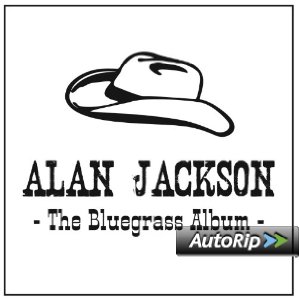 5. THE BLUEGRASS ALBUM, Alan Jackson (ACR/EMI)– What Alan Jackson has done on The Bluegrass Album is to let bluegrass come to him, rather than vice versa. He can’t summon that high lonesome plateau with his creamy smooth baritone voice that seems so perfectly made for country, so he doesn’t try. Pick any one of the 14 tracks—including the album closing “Blue Moon of Kentucky” (which is also an occasion for him to thank, by name, all the musicians, the producer and the engineer for helping him realize his bluegrass dream; and since EMI Nashville doesn’t have the good sense to send advances with liner copy, your intrepid reviewer can thank AJ for the sessionography)—and you’ll hear, intact, the classic Jackson phrasing, easygoing attitude, wry sense of humor and unalloyed sincerity you’ve heard on his country albums. You could take a vocal track and lay it over a traditional country backdrop and it would fit right in, which would not be the case with something from hardcore bluegrassers such as, oh, James King or Jamie Dailey, to cite standard bearers from different generations. But it works. Other than The Bluegrass Album being one of this year’s signal moments in roots releases, the other essential observation to make about it is that it should not be Alan Jackson’s last visit to these parts. He sounds like he belongs here. Follow this link to the Deep Roots review of The Bluegrass Album.
5. THE BLUEGRASS ALBUM, Alan Jackson (ACR/EMI)– What Alan Jackson has done on The Bluegrass Album is to let bluegrass come to him, rather than vice versa. He can’t summon that high lonesome plateau with his creamy smooth baritone voice that seems so perfectly made for country, so he doesn’t try. Pick any one of the 14 tracks—including the album closing “Blue Moon of Kentucky” (which is also an occasion for him to thank, by name, all the musicians, the producer and the engineer for helping him realize his bluegrass dream; and since EMI Nashville doesn’t have the good sense to send advances with liner copy, your intrepid reviewer can thank AJ for the sessionography)—and you’ll hear, intact, the classic Jackson phrasing, easygoing attitude, wry sense of humor and unalloyed sincerity you’ve heard on his country albums. You could take a vocal track and lay it over a traditional country backdrop and it would fit right in, which would not be the case with something from hardcore bluegrassers such as, oh, James King or Jamie Dailey, to cite standard bearers from different generations. But it works. Other than The Bluegrass Album being one of this year’s signal moments in roots releases, the other essential observation to make about it is that it should not be Alan Jackson’s last visit to these parts. He sounds like he belongs here. Follow this link to the Deep Roots review of The Bluegrass Album.
Alan Jackson, official video for ‘The Blue Ridge Mountain Song,’ from The Bluegrass Album
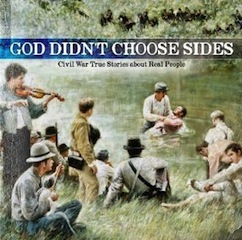 6. GOD DIDN’T CHOOSE SIDES: CIVIL WAR TRUE STORIES ABOUT REAL PEOPLE, VOL. 1, Various Artists (Rural Rhythm)–Rural Rhythm didn’t have to look far beyond its own roster to assemble an all-star roots cast to realize God Didn’t Choose Sides: Civil War True Stories about Real People, Vol. 1, reeling in ace producer and supremely gifted songwriter Steve Gulley to steer things in the studio; enlisting A-team musicians such as Sammy Shelor, Tim Stafford, Alan Bibey, Adam Steffey, Brandon Rickman, Ron Stewart and Justin Moses to back an all-star artist roster of Russell Moore, Carrie Hassler, Bradley Walker, Marty Raybon, Ronnie Bowman, the Lonesome River Band, Dale Ann Bradley, Gulley and Stafford, who in turn completely immerse themselves in songs written by the formidable likes of Brink Brinkman, Brad Davis, Paula Breedlove, Ray Edwards, Mike Evans, Terry Foust and, again, Gulley and Stafford (with whom you simply cannot go wrong). All of these artists deserve a standing ovation, a tip of the Hatlo hat and, a la Blazing Saddles, a laurel and hearty handshake for their commitment to giving listeners an unforgettable experience of how the war hit home on the most personal levels, in the lives of the unsung and many unknown combatants and family members who lived it on a daily basis not merely for the five years it endured, but for the rest of their days, either in memory, or in the fact of the visible wounds they carried with them to the grave. Follow this link to the Deep Roots review, “Voices from Beyond the Glow in the Sunset Skies.”
6. GOD DIDN’T CHOOSE SIDES: CIVIL WAR TRUE STORIES ABOUT REAL PEOPLE, VOL. 1, Various Artists (Rural Rhythm)–Rural Rhythm didn’t have to look far beyond its own roster to assemble an all-star roots cast to realize God Didn’t Choose Sides: Civil War True Stories about Real People, Vol. 1, reeling in ace producer and supremely gifted songwriter Steve Gulley to steer things in the studio; enlisting A-team musicians such as Sammy Shelor, Tim Stafford, Alan Bibey, Adam Steffey, Brandon Rickman, Ron Stewart and Justin Moses to back an all-star artist roster of Russell Moore, Carrie Hassler, Bradley Walker, Marty Raybon, Ronnie Bowman, the Lonesome River Band, Dale Ann Bradley, Gulley and Stafford, who in turn completely immerse themselves in songs written by the formidable likes of Brink Brinkman, Brad Davis, Paula Breedlove, Ray Edwards, Mike Evans, Terry Foust and, again, Gulley and Stafford (with whom you simply cannot go wrong). All of these artists deserve a standing ovation, a tip of the Hatlo hat and, a la Blazing Saddles, a laurel and hearty handshake for their commitment to giving listeners an unforgettable experience of how the war hit home on the most personal levels, in the lives of the unsung and many unknown combatants and family members who lived it on a daily basis not merely for the five years it endured, but for the rest of their days, either in memory, or in the fact of the visible wounds they carried with them to the grave. Follow this link to the Deep Roots review, “Voices from Beyond the Glow in the Sunset Skies.”
From God Didn’t Choose Sides: Civil War True Stories About Real People, Vol. 1, ‘The Legend of Jennie Wade,’ interview with songwriters Paula Breedlove and Brad Davis, performance by the Lonesome River Band.
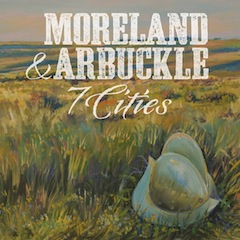 7. 7 CITIES, Moreland & Arbuckle (Telarc)—Kansas’s dynamic trio of Aaron Moreland and Dustin Arbuckle (with drummer/percussionist Kendall Newby) have in some ways come a long way from their DIY days but in other ways their growth over the years is unsurprising, no matter how impressive. Since being signed to Telarc in 2010 they’ve released three outstanding albums, each one more revealing than its predecessor of the band’s upward arc and greater ambitions. But those M&A fans that have been on board from the start well know of the band’s larger vision—2008’s 1861 was a masterwork of hill country blues with a couple of tough covers (Hound Dog Taylor’s “Gonna Send You Back to Georgia,” R.L. Burnside’s “See My Jumper”) mixed in with their own literate—musically and lyrically—originals, including the monumental, tragic tale of a permanently damaged Vietnam Vet, “The Legend,” which turned out to be inspired by Arbuckle’s father’s personal odyssey. In 2013 M&A delivered on all that promise with the searing 7 Cities, its animating impulse being the journey of Spanish conquistador Francisco Vásquez de Coronado and his quest for Quivira, one of the mythical seven cities of gold, which ultimately landed him near what is now Moreland & Arbuckle’s home town of Wichita, KS. The big, bold sound is not unusual for a M&A album, but it’s been further refined on 7 Cities by producer Matt Bayles, the first outside producer M&A have ever hired. Bayles’s resume includes projects with Mastodon, but here he’s fashioned a roaring but immediate soundscape with super-clear delineation of the instruments and Arbuckle’s soulful vocals. Note: instruments, plural. Aaron Moreland’s signature sizzling guitar work remains profoundly intact but Bayle’s has fleshed out the group sound a smidgen, just a smidgen but effectively so, with subtly deployed keyboards (played by himself and by Matt Benham), a steady bass bottom supplied by Eric Corson and Josephine Howell’s affecting background singing. Coronado’s quest is laid out in the first cut, the blistering stomp of “Quivira,” a juggernaut of merciless, stabbing guitar, raucous drumming, howling harp and guttural, bluesy moaning (and what sounds like a variation of a Native American chant at select junctures) relating to Coronado’s treacherous journey to his ultimate destination—history is a great subject but it’s rarely presented with as much fury as M&A generate here. In a surprise cover, M&A seem to poke a little fun at Coronado—who found not gold at Quivira but Native tribes, simple people rich in corn, beans and squash but no wealth to speak of—by retooling Tears for Fears’ “Everybody Wants to Rule the World” as a blues-drenched stomp with chiming guitars and a rather lighthearted comme ci, comme ça vocal by Arbuckle. Now, the whole album is not centered on the Coronado story, unless you really make some extreme interpretations. “Waste Away” is a heavyweight punch of a confrontation between a drug user throwing life away and a friend that won’t join in, driven by powerhouse drumming, searing harp work, an imploring lead vocal and Howell’s gospel-ized backup singing. The relentless boogie of “Road Blind” is in the M&A wheelhouse of yore but it might also be the band’s contemporary take on the fatigue that must surely have overwhelmed Coronado’s men as they journeyed deeper into the heartland. “Red Bricks” is an engaging, upbeat instrumental blues shuffle fueled by Moreland’s too-seldom-heart acoustic slide guitar sparring and juking with Arbuckle’s alternately shimmering and moaning harmonica as Newby keeps the bottom nailed down with sprightly brush drums. They even put some twang into their blues-rock with the sinister “The Devil In Me,” an advisory from a gent who proclaims “I bring misery with me” perhaps owing to the “poison running through my veins.” All in all, 7 Cities, even if it doesn’t always hew to the Coronado theme, is the best Moreland & Arbuckle yet, virtually without a weak link, and powerhouse beyond all reason. These guys are systematically, album by album, staking out turf all their own. What the future holds for them is indeed an exciting prospect to ponder.
7. 7 CITIES, Moreland & Arbuckle (Telarc)—Kansas’s dynamic trio of Aaron Moreland and Dustin Arbuckle (with drummer/percussionist Kendall Newby) have in some ways come a long way from their DIY days but in other ways their growth over the years is unsurprising, no matter how impressive. Since being signed to Telarc in 2010 they’ve released three outstanding albums, each one more revealing than its predecessor of the band’s upward arc and greater ambitions. But those M&A fans that have been on board from the start well know of the band’s larger vision—2008’s 1861 was a masterwork of hill country blues with a couple of tough covers (Hound Dog Taylor’s “Gonna Send You Back to Georgia,” R.L. Burnside’s “See My Jumper”) mixed in with their own literate—musically and lyrically—originals, including the monumental, tragic tale of a permanently damaged Vietnam Vet, “The Legend,” which turned out to be inspired by Arbuckle’s father’s personal odyssey. In 2013 M&A delivered on all that promise with the searing 7 Cities, its animating impulse being the journey of Spanish conquistador Francisco Vásquez de Coronado and his quest for Quivira, one of the mythical seven cities of gold, which ultimately landed him near what is now Moreland & Arbuckle’s home town of Wichita, KS. The big, bold sound is not unusual for a M&A album, but it’s been further refined on 7 Cities by producer Matt Bayles, the first outside producer M&A have ever hired. Bayles’s resume includes projects with Mastodon, but here he’s fashioned a roaring but immediate soundscape with super-clear delineation of the instruments and Arbuckle’s soulful vocals. Note: instruments, plural. Aaron Moreland’s signature sizzling guitar work remains profoundly intact but Bayle’s has fleshed out the group sound a smidgen, just a smidgen but effectively so, with subtly deployed keyboards (played by himself and by Matt Benham), a steady bass bottom supplied by Eric Corson and Josephine Howell’s affecting background singing. Coronado’s quest is laid out in the first cut, the blistering stomp of “Quivira,” a juggernaut of merciless, stabbing guitar, raucous drumming, howling harp and guttural, bluesy moaning (and what sounds like a variation of a Native American chant at select junctures) relating to Coronado’s treacherous journey to his ultimate destination—history is a great subject but it’s rarely presented with as much fury as M&A generate here. In a surprise cover, M&A seem to poke a little fun at Coronado—who found not gold at Quivira but Native tribes, simple people rich in corn, beans and squash but no wealth to speak of—by retooling Tears for Fears’ “Everybody Wants to Rule the World” as a blues-drenched stomp with chiming guitars and a rather lighthearted comme ci, comme ça vocal by Arbuckle. Now, the whole album is not centered on the Coronado story, unless you really make some extreme interpretations. “Waste Away” is a heavyweight punch of a confrontation between a drug user throwing life away and a friend that won’t join in, driven by powerhouse drumming, searing harp work, an imploring lead vocal and Howell’s gospel-ized backup singing. The relentless boogie of “Road Blind” is in the M&A wheelhouse of yore but it might also be the band’s contemporary take on the fatigue that must surely have overwhelmed Coronado’s men as they journeyed deeper into the heartland. “Red Bricks” is an engaging, upbeat instrumental blues shuffle fueled by Moreland’s too-seldom-heart acoustic slide guitar sparring and juking with Arbuckle’s alternately shimmering and moaning harmonica as Newby keeps the bottom nailed down with sprightly brush drums. They even put some twang into their blues-rock with the sinister “The Devil In Me,” an advisory from a gent who proclaims “I bring misery with me” perhaps owing to the “poison running through my veins.” All in all, 7 Cities, even if it doesn’t always hew to the Coronado theme, is the best Moreland & Arbuckle yet, virtually without a weak link, and powerhouse beyond all reason. These guys are systematically, album by album, staking out turf all their own. What the future holds for them is indeed an exciting prospect to ponder.

From 7 Cities, Moreland & Arbuckle’s ‘Quivira’
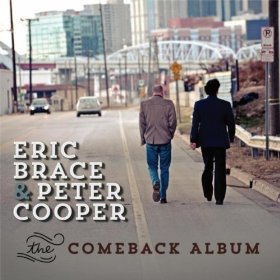 8. THE COMEBACK ALBUM, Eric Brace & Peter Cooper & OPENING DAY, Peter Cooper (Red Beet Records)– I have no idea why Eric Brace and Peter Cooper titled their third duo project The Comeback Album, except that they have stepped back into the fray as artists in their own right after masterfully steering their Tom T. Hall tribute, I Love: Tom T. Hall’s Songs of Fox Hollow (reviewed in the May 2011 issue of TheBluegrassSpecial.com) to a Grammy nomination. So I’m contemplating The Comeback Album’s first song, “Ancient History,” a gently rocking treatise fueled by Jen Gunderman’s evocative Wurlitzer in which a number of famous people from various walks of life (Magic Johnson, Jerry Jeff Walker, Ringo Starr, Richard Nixon, et al.) are name checked by their given names and their popular monikers alike (except for Dick Trickle, who “was a race car driver/really, he was a race car driver/a talented, popular race car driver,” the first of the disc’s several touches of Brace-Cooper’s distinctive wry humor—I especially enjoyed “Secret Sauce was Thousand Island”). Eventually a chorus arises, and advises in part, “…we are who we are/not who we’re gonna be/every passing moment is ancient history.” It’s a terrific song; it may sound like a knockoff of Billy Joel’s “We Didn’t Start the Fire,” except that it’s an infinitely better song, for starters, and says something far more meaningful about identity. Follow this link to the Deep Roots review of The Comeback Album.
8. THE COMEBACK ALBUM, Eric Brace & Peter Cooper & OPENING DAY, Peter Cooper (Red Beet Records)– I have no idea why Eric Brace and Peter Cooper titled their third duo project The Comeback Album, except that they have stepped back into the fray as artists in their own right after masterfully steering their Tom T. Hall tribute, I Love: Tom T. Hall’s Songs of Fox Hollow (reviewed in the May 2011 issue of TheBluegrassSpecial.com) to a Grammy nomination. So I’m contemplating The Comeback Album’s first song, “Ancient History,” a gently rocking treatise fueled by Jen Gunderman’s evocative Wurlitzer in which a number of famous people from various walks of life (Magic Johnson, Jerry Jeff Walker, Ringo Starr, Richard Nixon, et al.) are name checked by their given names and their popular monikers alike (except for Dick Trickle, who “was a race car driver/really, he was a race car driver/a talented, popular race car driver,” the first of the disc’s several touches of Brace-Cooper’s distinctive wry humor—I especially enjoyed “Secret Sauce was Thousand Island”). Eventually a chorus arises, and advises in part, “…we are who we are/not who we’re gonna be/every passing moment is ancient history.” It’s a terrific song; it may sound like a knockoff of Billy Joel’s “We Didn’t Start the Fire,” except that it’s an infinitely better song, for starters, and says something far more meaningful about identity. Follow this link to the Deep Roots review of The Comeback Album.
Peter Cooper and Eric Brace, ‘She Can’t Be Herself,’ live at Magnolia Avenue Studios of KDHX in St. Louis, May 3, 2013. Video shot by Ed Kleinberg, edited by Olivia Fugate.
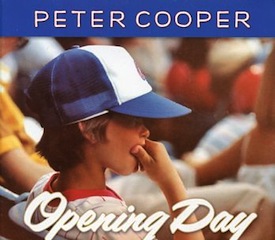 Following the release of his third duo album with Eric Brace, Peter Cooper returned in short order with his third solo album, Opening Day. More so than we hear on his work with Brace, Cooper’s gentle, assured singing voice assumes some Rodney Crowell flavor, and we know he shares in his literate, thoughtful songs a Crowell-like love of rhythmic wordplay and terse, clipped phrases. As evocative a solo album as 2013 saw, the title track of Opening Day is inspired by the birth of his son, Baker, an event that comes complete with a sense of new beginnings that go beyond the arrival of new offspring and infuse the whole of life, a fact Cooper seems to be coming to grips with on his lively autobiographical album opener “Much Better Now” (although, based on comments he made in a recent interview with Country Standard Time, we think he is exaggerating when he sings of being glad he doesn’t live in his little South Carolina home town anymore). Which perhaps explains why some narratives seem to bleed into others, as if they were chapters of the same biography. As in “Jenny Died at 25,” a soft shuffle about a gal who is not literally dead but feels like she hasn’t made much progress since hitting the quarter century mark (“happens to the best of ‘em/it’s a shame and it’s a crime/you can die at 25 and still live a long, long time…”). What’s to become of Jenny, so disillusioned so young? The answer may well be in the very next song, “Grandma’s Tattoo,” in which an elderly woman reflects on a time long ago, a trip to Pensacola, and a fling with an actor—all part of a wild sabbatical culminating in grandma coming home with a Batman tattoo (“…close to her heart, a private work of art/underneath the wool and the flannel/nobody coulda guessed, there upon her chest/same Bat time, same Bat channel!”). It’s one of Cooper’s finest moments as a songwriter, rife with affection and humor, completely non-judgmental (indeed, maybe even admiring). A Tom T. Hall cover, “A Million Miles to the City,” offers a thoughtful turn in reflecting on the lure of the city from the vantagepoint of small town America in a tune that connects Cooper to his own odyssey from Florence, SC, to Nashville. The thumping “Distraction,” concerning some friction between a busy, driven man and the woman he loves who asks, “Why do you work so hard?”, and the jittery “Part Time,” in which he looks back on some dead-end jobs he held en route any place but where he was at (“40 hours a week/howlin’ past my peak/that’s hard work even for a man in his prime/so I’m thinkin’ about goin’ part time…”) further plumb his autobiography in personalizing this album to a degree he has steered clear of, largely, in his other solo efforts or with Eric Brace in tow. These song descriptions only hint at the wonders of Opening Day: the music comes in the form of captivating, understated folk- and country-flavored arrangements, easy on the soul in augmenting Cooper’s literate yet folksy lyrics. Cooper gives all due credit to pedal steel guitarist Lloyd Green for these soundscapes, but Green gets memorable support from Jen Gunderman on keyboards and accordion and guitarists Richard Bennett and Thomm Jutz, among others. It would be easy enough to say they all make beautiful music together, because they do, but that cliché doesn’t do justice to songs as very human and meaningful as those Cooper delivers on Opening Day. The blessing of a fresh start has rarely been so eloquently described or deeply felt.
Following the release of his third duo album with Eric Brace, Peter Cooper returned in short order with his third solo album, Opening Day. More so than we hear on his work with Brace, Cooper’s gentle, assured singing voice assumes some Rodney Crowell flavor, and we know he shares in his literate, thoughtful songs a Crowell-like love of rhythmic wordplay and terse, clipped phrases. As evocative a solo album as 2013 saw, the title track of Opening Day is inspired by the birth of his son, Baker, an event that comes complete with a sense of new beginnings that go beyond the arrival of new offspring and infuse the whole of life, a fact Cooper seems to be coming to grips with on his lively autobiographical album opener “Much Better Now” (although, based on comments he made in a recent interview with Country Standard Time, we think he is exaggerating when he sings of being glad he doesn’t live in his little South Carolina home town anymore). Which perhaps explains why some narratives seem to bleed into others, as if they were chapters of the same biography. As in “Jenny Died at 25,” a soft shuffle about a gal who is not literally dead but feels like she hasn’t made much progress since hitting the quarter century mark (“happens to the best of ‘em/it’s a shame and it’s a crime/you can die at 25 and still live a long, long time…”). What’s to become of Jenny, so disillusioned so young? The answer may well be in the very next song, “Grandma’s Tattoo,” in which an elderly woman reflects on a time long ago, a trip to Pensacola, and a fling with an actor—all part of a wild sabbatical culminating in grandma coming home with a Batman tattoo (“…close to her heart, a private work of art/underneath the wool and the flannel/nobody coulda guessed, there upon her chest/same Bat time, same Bat channel!”). It’s one of Cooper’s finest moments as a songwriter, rife with affection and humor, completely non-judgmental (indeed, maybe even admiring). A Tom T. Hall cover, “A Million Miles to the City,” offers a thoughtful turn in reflecting on the lure of the city from the vantagepoint of small town America in a tune that connects Cooper to his own odyssey from Florence, SC, to Nashville. The thumping “Distraction,” concerning some friction between a busy, driven man and the woman he loves who asks, “Why do you work so hard?”, and the jittery “Part Time,” in which he looks back on some dead-end jobs he held en route any place but where he was at (“40 hours a week/howlin’ past my peak/that’s hard work even for a man in his prime/so I’m thinkin’ about goin’ part time…”) further plumb his autobiography in personalizing this album to a degree he has steered clear of, largely, in his other solo efforts or with Eric Brace in tow. These song descriptions only hint at the wonders of Opening Day: the music comes in the form of captivating, understated folk- and country-flavored arrangements, easy on the soul in augmenting Cooper’s literate yet folksy lyrics. Cooper gives all due credit to pedal steel guitarist Lloyd Green for these soundscapes, but Green gets memorable support from Jen Gunderman on keyboards and accordion and guitarists Richard Bennett and Thomm Jutz, among others. It would be easy enough to say they all make beautiful music together, because they do, but that cliché doesn’t do justice to songs as very human and meaningful as those Cooper delivers on Opening Day. The blessing of a fresh start has rarely been so eloquently described or deeply felt.
Peter Cooper performs the title track from his third solo album, Opening Day
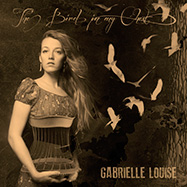 9. THE BIRD IN MY CHEST, Gabrielle Louise (www.gabriellelouise.com)– Years in the making and the product of her coast to coast travels, The Bird In My Chest is a mature, fully realized work of art by one of the finest young singer-songwriters of her generation. The deliberate nature of the project has paid off by, in effect, changing the way we have to think about Ms. Gabrielle Louise (who has been living around the Denver area in recent years but is moving, or has moved, to Paonia, CO, which gives that solid music town quite a one-two punch with her joining Honey Don’t in calling it home). The music is consistent with what we’ve heard since she turned heads in 2008 with her third studio effort, Cigarettes for Sentiments: a scintillating, atmospheric blend of acoustic and electric instruments, solid but unobtrusive percussion and percussive effects, some jazzy inflections in the arrangements when the keys and horns come in, and sweet, affecting vocals notable for the resolve in her phrasing, the drama she controls so masterfully in her readings and the sense she leaves of being completely open and revealed emotionally. But there’s more to this Bird In My Chest than its riveting songs. This ambitious undertaking comes in an oversized EP jacket (like old vinyl British EPs were packaged) and the CD itself locks into a peg on the inner front cover. The next page begins a 51-page booklet containing her original song lyrics (and those of the two covers she recorded for the album, Donovan’s “Colours” and Cuban folk icon Silvio Rodriguez’s “Te Amaré”), and selections of her short stories and poetry. The challenge for a reviewer is whether to focus on the prose, the poetry or the music, because it’s all so impressive—you’ll be hooked on the prose by the end of the first ambiguous gem of a short story, “The Letting Go,” a first-person account of a “sacredly platonic” relationship that the male in the equation, now in a committed relationship and soon to be wed, seems embittered by for it never evolving into an intimate, connected form. Care to know what’s behind the glamour of the wandering troubadour lifestyle? The stream-of-consciousness “Negatives On a Reel” will explain why one artist has famously queried, “Ah, the glamour! When will it start?”
9. THE BIRD IN MY CHEST, Gabrielle Louise (www.gabriellelouise.com)– Years in the making and the product of her coast to coast travels, The Bird In My Chest is a mature, fully realized work of art by one of the finest young singer-songwriters of her generation. The deliberate nature of the project has paid off by, in effect, changing the way we have to think about Ms. Gabrielle Louise (who has been living around the Denver area in recent years but is moving, or has moved, to Paonia, CO, which gives that solid music town quite a one-two punch with her joining Honey Don’t in calling it home). The music is consistent with what we’ve heard since she turned heads in 2008 with her third studio effort, Cigarettes for Sentiments: a scintillating, atmospheric blend of acoustic and electric instruments, solid but unobtrusive percussion and percussive effects, some jazzy inflections in the arrangements when the keys and horns come in, and sweet, affecting vocals notable for the resolve in her phrasing, the drama she controls so masterfully in her readings and the sense she leaves of being completely open and revealed emotionally. But there’s more to this Bird In My Chest than its riveting songs. This ambitious undertaking comes in an oversized EP jacket (like old vinyl British EPs were packaged) and the CD itself locks into a peg on the inner front cover. The next page begins a 51-page booklet containing her original song lyrics (and those of the two covers she recorded for the album, Donovan’s “Colours” and Cuban folk icon Silvio Rodriguez’s “Te Amaré”), and selections of her short stories and poetry. The challenge for a reviewer is whether to focus on the prose, the poetry or the music, because it’s all so impressive—you’ll be hooked on the prose by the end of the first ambiguous gem of a short story, “The Letting Go,” a first-person account of a “sacredly platonic” relationship that the male in the equation, now in a committed relationship and soon to be wed, seems embittered by for it never evolving into an intimate, connected form. Care to know what’s behind the glamour of the wandering troubadour lifestyle? The stream-of-consciousness “Negatives On a Reel” will explain why one artist has famously queried, “Ah, the glamour! When will it start?”
Ultimately, the music sells the concept. For Ms. Louise there is an unusual amount of romantic angst and leave taking informing her new songs, so you can only guess that this most personal of songwriters was experiencing some issues over the timeframe of these compositions coming together. That said, though she freely vents her anger and/or frustration at times—“the answer is no/the reason is because/if you’re gonna act like a child/I’m gonna treat you like one/as far as I’m concerned/we only get to do this once/and we all get what we ask for, my love/we all get what we ask for” she declares at the outset of the simmering “What We Ask For”—the yin-yang of these songs is in how she doesn’t figuratively storm out but instead figuratively opens her arms and heart, beckoning for understanding: “I choose gentleness,” she whispers in the chorus, “I choose truth/you might not mind the games/I do.” On the other hand, she is righteously outraged by a paramour’s situational ethics in the pounding “Marionette,” with its brutal kissoff of “How do you act when you feel cornered? And what becomes of your perfect morals?” Tenderness does surface on occasion—the richly textured, percussive atmosphere of “End of the Blues” frames a sweet remembrance of love in all its painful and pleasurable iterations, and her sultry, bluesy ode to the single life, “I Propose a Toast,” is curiously bracing, even in its melancholy, mostly owing to the determination she exudes in coming to an understanding that “there ain’t nobody nowhere that doesn’t ache.” Ending on a philosophical note with “When Satan Saw Inside the Cradle,” her wistful vocal pillowed by soft, keening horns and a lightly strummed acoustic guitar, Ms. Louise muses ontologically about the “mystery” of her dreams upon getting outside herself in recognizing the world spinning on a larger axis than that circumscribed by her own experiences. “The universe expanded/bloomed from a tiny seed/became this breathing thing/the rest is history, oh, oh…”: so she concludes what is a different kind of torch album, one that does not allow sadness to linger but lashes out against it, looks ahead to a sunnier day and lets the rest of the world go by, because you can’t alter basic—and entirely predictable–human impulses of humans or the turning of the earth. The Bird In My Chest is available at the artist’s website, The Gabrielle Louise Show.
http://www.youtube.com/watch?v=fqf1D9IwG4I
Gabrielle Louise, ‘What We Ask For,’ a solo acoustic version of the third track on The Bird In My Chest.
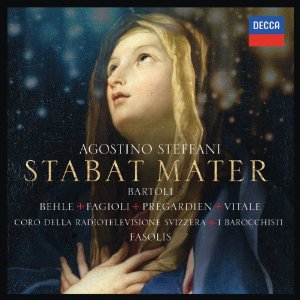 10. STABAT MATER, Agostino Steffani, Cecilia Bartoli, Nuria Rial, Daniel Behle, Franco Fagioli, Julian Prégardian, Salvo Vitale, Coro della Radiotelevisione Svezzera, Diego Fasolis, Conductor (Decca)– Cecilia Bartoli’s zeal for rediscovering, performing, and recording Steffani’s music is the raison d’être for this disc, but as in all of the projects that enjoy her advocacy she brings to this recording absolute preparedness. Though her voice remains a full-bodied mezzo-soprano with access to a colorful, well-supported lower register, Ms. Bartoli here sings music conceived by the composer for soprano. The motet “Non plus me ligate,” Steffani’s only surviving sacred composition for solo soprano, receives from Ms. Bartoli a performance in which all of the best qualities of her singing are in evidence: crisp diction with consonants sharply defined and vowels properly placed on the beat, sovereign command of the requisite bravura technique, and complete security of tone throughout the range. Ms. Bartoli explores the nuances of the melancholic text without artificially darkening either her tone or her approach, conveying the despondency of the verses by articulation of the text and the artful interplay among the voice and the violins. In the past, Ms. Bartoli’s enthusiasm and emphatic delivery have occasionally led to her singing overpowering the music at hand, but her singing in this performance mixes audible love for the music—and for singing it—with restraint born of genuine respect for the texts and the unwavering faith with which the composer set them. Follow this link to Joseph Newsome’s Deep Roots review of Stabat Mater.
10. STABAT MATER, Agostino Steffani, Cecilia Bartoli, Nuria Rial, Daniel Behle, Franco Fagioli, Julian Prégardian, Salvo Vitale, Coro della Radiotelevisione Svezzera, Diego Fasolis, Conductor (Decca)– Cecilia Bartoli’s zeal for rediscovering, performing, and recording Steffani’s music is the raison d’être for this disc, but as in all of the projects that enjoy her advocacy she brings to this recording absolute preparedness. Though her voice remains a full-bodied mezzo-soprano with access to a colorful, well-supported lower register, Ms. Bartoli here sings music conceived by the composer for soprano. The motet “Non plus me ligate,” Steffani’s only surviving sacred composition for solo soprano, receives from Ms. Bartoli a performance in which all of the best qualities of her singing are in evidence: crisp diction with consonants sharply defined and vowels properly placed on the beat, sovereign command of the requisite bravura technique, and complete security of tone throughout the range. Ms. Bartoli explores the nuances of the melancholic text without artificially darkening either her tone or her approach, conveying the despondency of the verses by articulation of the text and the artful interplay among the voice and the violins. In the past, Ms. Bartoli’s enthusiasm and emphatic delivery have occasionally led to her singing overpowering the music at hand, but her singing in this performance mixes audible love for the music—and for singing it—with restraint born of genuine respect for the texts and the unwavering faith with which the composer set them. Follow this link to Joseph Newsome’s Deep Roots review of Stabat Mater.
http://www.youtube.com/watch?v=ArogHzpCvms
Cecilia Bartoli, ‘Stabat Mater’ (Agostino Steffani), Diego Fasolis, musical director; I Barocchisti, orchestra
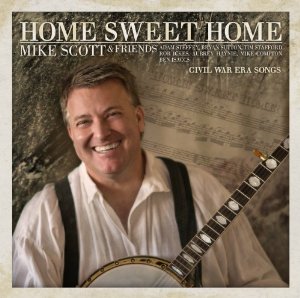 11. HOME SWEET HOME: CIVIL WAR ERA SONGS, Mike Scott & Friends (Rural Rhythm)– Artists on the Rural Rhythm label are in the midst of their own multi-volume commemoration of the War, and with the release of Mike Scott’s all-instrumental tribute, Home Sweet Home: Civil War Era Songs, they’re batting 1.000, two for two, in a stirring follow-up to the label’s first volume in this series, the acclaimed God Didn’t Choose Sides: Civil War Stories about Real People, Vol. 1 (this publication’s Album of the Week, April 11, 2013). In contrast to that earlier volume, Scott’s entry in the series is comprised not of original songs penned by contemporary writers (and all based on, as the title says, real people and how the war affected them) but of songs that mostly pre-date the war years (and one from the late 20th century!) but had never gone out of style with the troops or the general populace–this was not a time of one-hit wonders or disposable pop but of tunes treasured for their sentiments expressing heartfelt human longings or strivings and unabashed sentimentality offering an escape from realities untenable at the time they were written and, obviously, more so once the first shots were fired on Fort Sumter at 4:30 a.m. on April 12, 1861. Arguably the most amazing fact about Scott’s 14 selections is how many of them have endured as roots standards–such as “Soldier’s Joy” (a happy number with, in its lyrics, a dark penumbra describing substance abuse among the troops) and “Bonaparte’s Retreat,” to name but two–and how a few others, or at least “Swing Low, Sweet Chariot,” are part of America’s national fabric, and perhaps are being sung somewhere every day. Follow this link to the Deep Roots review of Home Sweet Home: Civil War Era Songs.
11. HOME SWEET HOME: CIVIL WAR ERA SONGS, Mike Scott & Friends (Rural Rhythm)– Artists on the Rural Rhythm label are in the midst of their own multi-volume commemoration of the War, and with the release of Mike Scott’s all-instrumental tribute, Home Sweet Home: Civil War Era Songs, they’re batting 1.000, two for two, in a stirring follow-up to the label’s first volume in this series, the acclaimed God Didn’t Choose Sides: Civil War Stories about Real People, Vol. 1 (this publication’s Album of the Week, April 11, 2013). In contrast to that earlier volume, Scott’s entry in the series is comprised not of original songs penned by contemporary writers (and all based on, as the title says, real people and how the war affected them) but of songs that mostly pre-date the war years (and one from the late 20th century!) but had never gone out of style with the troops or the general populace–this was not a time of one-hit wonders or disposable pop but of tunes treasured for their sentiments expressing heartfelt human longings or strivings and unabashed sentimentality offering an escape from realities untenable at the time they were written and, obviously, more so once the first shots were fired on Fort Sumter at 4:30 a.m. on April 12, 1861. Arguably the most amazing fact about Scott’s 14 selections is how many of them have endured as roots standards–such as “Soldier’s Joy” (a happy number with, in its lyrics, a dark penumbra describing substance abuse among the troops) and “Bonaparte’s Retreat,” to name but two–and how a few others, or at least “Swing Low, Sweet Chariot,” are part of America’s national fabric, and perhaps are being sung somewhere every day. Follow this link to the Deep Roots review of Home Sweet Home: Civil War Era Songs.
AUDIO CLIP: Mike Scott & Friends (Adam Steffey, Rob Ickes, Aubrey Haynie, Tim Stafford, Jeff Taylor, Penny Whistle, Ben Isaacs), ‘The Girl I Left Behind Me,’ from Home Sweet Home: Civil War Era Songs
 12. JAMES WHITBOURN: ANNELIES, Westminster William Voices, Lincoln Trio, Bharat Chandra (clarinet), Arianna Zuckerman (Soprano), James Jordan (conductor) (Naxos)– Though concert audiences have been moved by James Whitbourn’s riveting Annelies since its premier in 2005, the towering work has been unavailable on CD. This all changes on January 22, when Naxos finally releases Whitbourn’s monument. Annelies is the first adaptation of the diary of Anne Frank into a large-scale choral work (with small sections written in Dutch and German), 75 minutes in length, for soprano soloist, choir and instrumentalists. The libretto by Melanie Challenger is a translation and distillation from The Diary of Anne Frank. (Annelies is the full forename of Anne Frank, now commonly referred to by her abbreviated forename, Anne. Although her story had been choreographed for ballet as early as 1959, this is said to be the first authorized musical setting of the diary.). Observed one reviewer: The deliciously hopeful theme of Annelies’ blue sky, and the highlight of this work, is introduced to a dreamy klezmer-infused waltz and concludes in the final melancholy meditation, “As long as you can look fearlessly at the sky, you’ll know you’re pure within.” Follow this link to the Deep Roots Classical Perspectives feature on James Whitbourn: Annelies.
12. JAMES WHITBOURN: ANNELIES, Westminster William Voices, Lincoln Trio, Bharat Chandra (clarinet), Arianna Zuckerman (Soprano), James Jordan (conductor) (Naxos)– Though concert audiences have been moved by James Whitbourn’s riveting Annelies since its premier in 2005, the towering work has been unavailable on CD. This all changes on January 22, when Naxos finally releases Whitbourn’s monument. Annelies is the first adaptation of the diary of Anne Frank into a large-scale choral work (with small sections written in Dutch and German), 75 minutes in length, for soprano soloist, choir and instrumentalists. The libretto by Melanie Challenger is a translation and distillation from The Diary of Anne Frank. (Annelies is the full forename of Anne Frank, now commonly referred to by her abbreviated forename, Anne. Although her story had been choreographed for ballet as early as 1959, this is said to be the first authorized musical setting of the diary.). Observed one reviewer: The deliciously hopeful theme of Annelies’ blue sky, and the highlight of this work, is introduced to a dreamy klezmer-infused waltz and concludes in the final melancholy meditation, “As long as you can look fearlessly at the sky, you’ll know you’re pure within.” Follow this link to the Deep Roots Classical Perspectives feature on James Whitbourn: Annelies.
[spacer height=”40px”]
Excerpts from James Whitbourn’s Annelies
 13. THREE MOUNTAIN PASS, Van-Anh Vanessa Vo (Innova)– The passionate and dauntingly gifted Vietnamese instrumentalist-composer Van-Anh Vanessa Vo knows about hand, and she’s got it. A right hand, to be sure, but her left hand is the one that coaxes the soul out of her music. “It brings out all the colors, everything you want to hear, the bending and sliding notes,” she says of the magical left hand. “Otherwise, with just the right hand, the melody feels so dry. The right hand is the father who sired me, but the left hand is my mother who raised me.” The left hand’s color and emotive quality burst through the diverse and intriguing pieces of Three Mountain Pass. A masterful player of the 16-string dan Tranh—a zither with moveable bridges and the springy, bending tones resembling the koto—and the pitch-bending monochord dan Bau, Vo draws on the dozens of traditional genres found in Vietnam to craft new arrangements and compositions. Whether setting a sensual 18th-century poem to a newly invented instrument (“Three Mountain Pass”) or completely upending one of Satie’s Gnossiennes, Vo brings virtuosic subtlety and profound emotion to her work, a keen ear for the essence of her roots and their potential resonance with contemporary sounds. Follow this link to the Deep Roots review of Three Mountain Pass and interview with Van-Anh Vanessa Vo.
13. THREE MOUNTAIN PASS, Van-Anh Vanessa Vo (Innova)– The passionate and dauntingly gifted Vietnamese instrumentalist-composer Van-Anh Vanessa Vo knows about hand, and she’s got it. A right hand, to be sure, but her left hand is the one that coaxes the soul out of her music. “It brings out all the colors, everything you want to hear, the bending and sliding notes,” she says of the magical left hand. “Otherwise, with just the right hand, the melody feels so dry. The right hand is the father who sired me, but the left hand is my mother who raised me.” The left hand’s color and emotive quality burst through the diverse and intriguing pieces of Three Mountain Pass. A masterful player of the 16-string dan Tranh—a zither with moveable bridges and the springy, bending tones resembling the koto—and the pitch-bending monochord dan Bau, Vo draws on the dozens of traditional genres found in Vietnam to craft new arrangements and compositions. Whether setting a sensual 18th-century poem to a newly invented instrument (“Three Mountain Pass”) or completely upending one of Satie’s Gnossiennes, Vo brings virtuosic subtlety and profound emotion to her work, a keen ear for the essence of her roots and their potential resonance with contemporary sounds. Follow this link to the Deep Roots review of Three Mountain Pass and interview with Van-Anh Vanessa Vo.
Erik Satie’s ‘Gnossienne No. 3,’ a live version of the song from Van-Anh Vanessa Vo’s Three Mountain Pass album, with Breath of Asia at Ohlone College, Fremont, CA. With improvisation on Dan Bau (Van-Anh Vo), Piano (Kumi Uyeda) and Violin (Khac-Quan Nguyen).
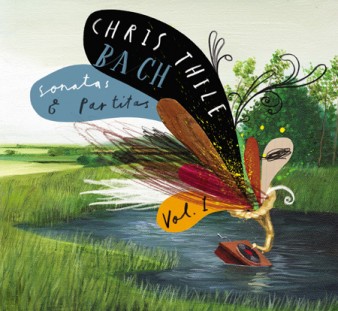 14. BACH: SONATAS & PARTITAS 1, Chris Thile (Nonesuch)– Let’s get the obvious out of the way: all of Bach’s solo works are incredibly challenging to perform. The technical challenge of playing the notes as they’re written on the page ranges anywhere from formidable to breaking-out-in-a-sweat-just-thinking-about-it. (I can only speak from experience in performing the cello suites, but it is sometimes almost comically apparent that they were written by a guy that was used to playing music with both hands and feet simultaneously!) Thile totally nails it here–his characteristically crisp, lithe and fleet finger picking makes for an experience nothing short of spectacular in fast-paced pieces such as the “Corrente” from Partita No. 1 in B minor. However, the true challenge presented by Bach is to play his pieces in such a way that their substantial soul and emotion isn’t lost in the complex and sometimes feverishly metric Baroque style. What I love about Thile’s instrumental compositions and performing style is the rich emotional sweetness with which he imbues his music. He makes the mandolin sing—not merely by his impeccable technique and feel for tone and texture, but by letting it be a conduit for the joy he feels from this music. Thile engages the music in a way that is quite spiritual, revealing an elevated sense of connection not only with his source material and its composer, but with the world at large–thus the “special sauce” of the full Bach experience Thile delivers with profound, soulful conviction. Follow this link to the Deep Roots review of Bach: Sonatas & Partitas 1.
14. BACH: SONATAS & PARTITAS 1, Chris Thile (Nonesuch)– Let’s get the obvious out of the way: all of Bach’s solo works are incredibly challenging to perform. The technical challenge of playing the notes as they’re written on the page ranges anywhere from formidable to breaking-out-in-a-sweat-just-thinking-about-it. (I can only speak from experience in performing the cello suites, but it is sometimes almost comically apparent that they were written by a guy that was used to playing music with both hands and feet simultaneously!) Thile totally nails it here–his characteristically crisp, lithe and fleet finger picking makes for an experience nothing short of spectacular in fast-paced pieces such as the “Corrente” from Partita No. 1 in B minor. However, the true challenge presented by Bach is to play his pieces in such a way that their substantial soul and emotion isn’t lost in the complex and sometimes feverishly metric Baroque style. What I love about Thile’s instrumental compositions and performing style is the rich emotional sweetness with which he imbues his music. He makes the mandolin sing—not merely by his impeccable technique and feel for tone and texture, but by letting it be a conduit for the joy he feels from this music. Thile engages the music in a way that is quite spiritual, revealing an elevated sense of connection not only with his source material and its composer, but with the world at large–thus the “special sauce” of the full Bach experience Thile delivers with profound, soulful conviction. Follow this link to the Deep Roots review of Bach: Sonatas & Partitas 1.
Sonata No. 1 in G Minor, BWV 1001: II: Fuga; Allegro, from Chris Thile’s Bach: Sonatas & Partitas 1.
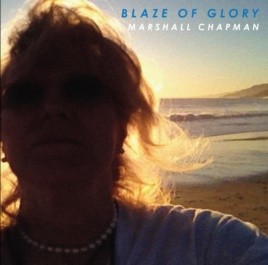 15. BLAZE OF GLORY, Marshall Chapman (Tailgirl Records)—After the triumph of Big Lonesome, her acclaimed 2010 album inspired by her friendship with the late Tim Krekel, Marshall Chapman wasn’t sure she had any more to say as a songwriter. Then came a fateful trip to Mexico during a time of great personal crisis. “I had myself convinced my muse lived down there,” she says, and so she dug deep. “I was in free fall, and the songs just kept coming.” The result is Blaze of Glory, which is arguably more Marshall Chapman than we’ve ever had on record before. Defiant, unapologetic, flirty, naughty here, tender there, self affirming and life affirming, the album’s tough, bare-knuckle sound and Chapman’s gritty vocalizing draw you in and hold your attention, and then some. She can cast a spell, can Marshall, and she does it here with seeming ease, from the Bo Biddley beat underpinning her heated duet with Todd Snider on “Love in the Wind,” it being a discourse on an evanescent lover, to the jazzy small combo vibe backing her sultry reading of the Hoagy Carmichael-Ned Washington chestnut, “The Nearness of You,” which might well be her way of swooning over the aforementioned evanescent lover. The other cover here is equally remarkable: a smoky, slow blues take on the Delmore Brothers’ “Blues Stay Away from Me,” featuring some fine, succinct lead guitar work by Will Kimbrough in an evocative arrangement framing Chapman’s weary—but resolute—vocal. Otherwise Blaze of Glory is a glorious statement of purpose on this artist’s part, whether it’s the declarations of independence she asserts in the stomping “I Don’t Want Nobody” to her figurative finger to the Grim Reaper in the loping country-flavored missive “Not Afraid to Die” that comes complete with clearly defined priorities as summarized lyrically in the philosophical maxim “the only thing that matters in the end/is the love you gave to those you loved the best.” The aforementioned Will Kimbrough is a virtual second voice to Chapman’s throughout; Mike Utley, like Kimbrough a Big Lonesome veteran, is marvelous in underplaying, in being a spectral presence; and Big Lonesome rhythm section Casey Wood (drums, vibes, percussion) and Jim Mayer (bass) keep it all moving and rooted at once. Chapman even got Rodney Crowell to shoot the cover photo. Neither it nor she gets any better than this.
15. BLAZE OF GLORY, Marshall Chapman (Tailgirl Records)—After the triumph of Big Lonesome, her acclaimed 2010 album inspired by her friendship with the late Tim Krekel, Marshall Chapman wasn’t sure she had any more to say as a songwriter. Then came a fateful trip to Mexico during a time of great personal crisis. “I had myself convinced my muse lived down there,” she says, and so she dug deep. “I was in free fall, and the songs just kept coming.” The result is Blaze of Glory, which is arguably more Marshall Chapman than we’ve ever had on record before. Defiant, unapologetic, flirty, naughty here, tender there, self affirming and life affirming, the album’s tough, bare-knuckle sound and Chapman’s gritty vocalizing draw you in and hold your attention, and then some. She can cast a spell, can Marshall, and she does it here with seeming ease, from the Bo Biddley beat underpinning her heated duet with Todd Snider on “Love in the Wind,” it being a discourse on an evanescent lover, to the jazzy small combo vibe backing her sultry reading of the Hoagy Carmichael-Ned Washington chestnut, “The Nearness of You,” which might well be her way of swooning over the aforementioned evanescent lover. The other cover here is equally remarkable: a smoky, slow blues take on the Delmore Brothers’ “Blues Stay Away from Me,” featuring some fine, succinct lead guitar work by Will Kimbrough in an evocative arrangement framing Chapman’s weary—but resolute—vocal. Otherwise Blaze of Glory is a glorious statement of purpose on this artist’s part, whether it’s the declarations of independence she asserts in the stomping “I Don’t Want Nobody” to her figurative finger to the Grim Reaper in the loping country-flavored missive “Not Afraid to Die” that comes complete with clearly defined priorities as summarized lyrically in the philosophical maxim “the only thing that matters in the end/is the love you gave to those you loved the best.” The aforementioned Will Kimbrough is a virtual second voice to Chapman’s throughout; Mike Utley, like Kimbrough a Big Lonesome veteran, is marvelous in underplaying, in being a spectral presence; and Big Lonesome rhythm section Casey Wood (drums, vibes, percussion) and Jim Mayer (bass) keep it all moving and rooted at once. Chapman even got Rodney Crowell to shoot the cover photo. Neither it nor she gets any better than this.
Marshall Chapman, the official video for ‘I Don’t Want Nobody,’ from Blaze of Glory
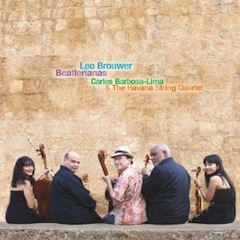 16. LEO BROUWER: BEATLERIANAS, Carlos Barbosa-Lima & The Havana String Quartet (Zoho)—Some artists celebrate the Great American Songbook, but on Leo Brouwer: Beatlerianas, guitar master Carlos Barbosa-Lima and the Latin Grammy winning Havana String Quartet celebrate a whole other great songbook, that being the one composed by legendary Cuban composer-conductor-guitarist Leo Brouwer. Like Ms. Brohn’s album, Beatlerianas has an abiding quiet about it, but only in ambience. These musicians, as gifted as any in the world, accept the challenge of works by Brouwer that are both technically and intellectually demanding. Their genius, of course, is in making their program’s complexities subservient to the heart. Exuding soulfulness with every thoughtfully picked guitar passage, with every elegantly formulated string part, Beatlerianas hits you where you live. Indeed, for a certain generation all sorts of memories will be stirred by the title track, “Beatlerianas for guitar and string quartet,” a seven-part suite Brouwer originally composed for guitar and string orchestra in 1985, at the urging of Japanese guitarist Ichiro Suzuki. Follow this link to the Deep Roots review of Leo Brouwer: Beatlerianas.
16. LEO BROUWER: BEATLERIANAS, Carlos Barbosa-Lima & The Havana String Quartet (Zoho)—Some artists celebrate the Great American Songbook, but on Leo Brouwer: Beatlerianas, guitar master Carlos Barbosa-Lima and the Latin Grammy winning Havana String Quartet celebrate a whole other great songbook, that being the one composed by legendary Cuban composer-conductor-guitarist Leo Brouwer. Like Ms. Brohn’s album, Beatlerianas has an abiding quiet about it, but only in ambience. These musicians, as gifted as any in the world, accept the challenge of works by Brouwer that are both technically and intellectually demanding. Their genius, of course, is in making their program’s complexities subservient to the heart. Exuding soulfulness with every thoughtfully picked guitar passage, with every elegantly formulated string part, Beatlerianas hits you where you live. Indeed, for a certain generation all sorts of memories will be stirred by the title track, “Beatlerianas for guitar and string quartet,” a seven-part suite Brouwer originally composed for guitar and string orchestra in 1985, at the urging of Japanese guitarist Ichiro Suzuki. Follow this link to the Deep Roots review of Leo Brouwer: Beatlerianas.
http://www.youtube.com/watch?v=dMlimpBr9NI
Legendary Cuban composer-conductor-guitarist Leo Brouwer’s original version of ‘Eleanor Rigby,’ from his suite for guitar and string orchestra, ‘From Yesterday to Penny Lane.’ This suite is the focal point of the 2013 album by Carlos Barbosa-Lima & the Havana String Quartet, Beatlerianas.
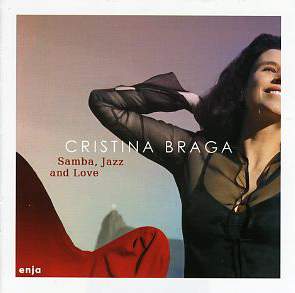 17. SAMBA, JAZZ AND LOVE, Cristina Braga (Enja Records)– Being the foremost harpist in Brazil is about as unusual a distinction for a musician as being a classical harmonica player anywhere (a la John Sebastian Sr.). Cristina Braga is indeed Brazil’s foremost harpist, and she has been an ambassador in that regard both for her country and her instrument. She’s crossed genre lines to perform with classical and popular artists alike (both Sting and his Police cohort Andy Summers have employed her services), with symphony orchestras and in various competitions, including one held in 2009 by the Federal University of Rio de Janeiro, after which she was hired by the University as Professor of Harp. Her discography numbers 16 albums, released both independently and lately through the Enja label. The captivating Samba, Jazz and Love is the latest of those Stateside releases, and here’s hoping it’s followed by many more. Singing in English and Portuguese (with English translations in full or in part in the liner booklet to give listeners at least the gist of the song), Ms. Braga follows in the seductive footsteps of her illustrious, alluring Brazilian predecessor Astrud Gilberto, although the former’s voice is even more feathery than the latter’s, amazingly enough. No matter the language, Ms. Braga is never less than arresting when it’s time to sing. Her English rendition of Jobim’s classic “Desafinado” sounds a little too deliberate on first blush, but over the course of its 4:40 running time, the rhythm of her singing becomes near-hypnotic, even more so on repeat listening when the performance really gets under the skin. Follow this link to the Deep Roots review of Samba, Jazz and Love.
17. SAMBA, JAZZ AND LOVE, Cristina Braga (Enja Records)– Being the foremost harpist in Brazil is about as unusual a distinction for a musician as being a classical harmonica player anywhere (a la John Sebastian Sr.). Cristina Braga is indeed Brazil’s foremost harpist, and she has been an ambassador in that regard both for her country and her instrument. She’s crossed genre lines to perform with classical and popular artists alike (both Sting and his Police cohort Andy Summers have employed her services), with symphony orchestras and in various competitions, including one held in 2009 by the Federal University of Rio de Janeiro, after which she was hired by the University as Professor of Harp. Her discography numbers 16 albums, released both independently and lately through the Enja label. The captivating Samba, Jazz and Love is the latest of those Stateside releases, and here’s hoping it’s followed by many more. Singing in English and Portuguese (with English translations in full or in part in the liner booklet to give listeners at least the gist of the song), Ms. Braga follows in the seductive footsteps of her illustrious, alluring Brazilian predecessor Astrud Gilberto, although the former’s voice is even more feathery than the latter’s, amazingly enough. No matter the language, Ms. Braga is never less than arresting when it’s time to sing. Her English rendition of Jobim’s classic “Desafinado” sounds a little too deliberate on first blush, but over the course of its 4:40 running time, the rhythm of her singing becomes near-hypnotic, even more so on repeat listening when the performance really gets under the skin. Follow this link to the Deep Roots review of Samba, Jazz and Love.
The official video for ‘Love Parfait,’ from Cristina Braga’s Samba, Jazz and Love
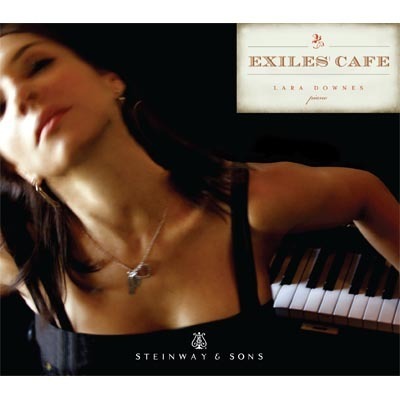 18. EXILES’ CAFÉ, Lara Downes (Steinway and Sons)– Over the last decade, the San Francisco pianist Lara Downes has made several recordings around some stimulating themes, including American Ballads as interpreted by a broad swath of composers, and Dream of Me, featuring various nocturnes and reveries. Downes’s latest album, Exiles’ Café, focuses on the concept of music written in exile, expressed through short pieces by composers including Chopin, Milhaud, Bartok, Weill, and Rachmaninoff. As Downes recently explained, “Cafes have historically housed and sheltered exiles and emigres in every corner of the globe, through so many journeys and displacements.” In other words, think Cafe Centrale or Les Deux Magots, rather than your typical chain coffee shop. “The project illustrates the global currents of diaspora and exile, which create artistic confluence among people from many different backgrounds of time and place,” Ms. Downes told blogger Frances Wilson of the Cross-Eyed Pianist blog. “I think the theme of displacement is one with which everyone is familiar at some level.” Follow this link to the Deep Roots review of Exiles’ Café and interview with Lara Downes.
18. EXILES’ CAFÉ, Lara Downes (Steinway and Sons)– Over the last decade, the San Francisco pianist Lara Downes has made several recordings around some stimulating themes, including American Ballads as interpreted by a broad swath of composers, and Dream of Me, featuring various nocturnes and reveries. Downes’s latest album, Exiles’ Café, focuses on the concept of music written in exile, expressed through short pieces by composers including Chopin, Milhaud, Bartok, Weill, and Rachmaninoff. As Downes recently explained, “Cafes have historically housed and sheltered exiles and emigres in every corner of the globe, through so many journeys and displacements.” In other words, think Cafe Centrale or Les Deux Magots, rather than your typical chain coffee shop. “The project illustrates the global currents of diaspora and exile, which create artistic confluence among people from many different backgrounds of time and place,” Ms. Downes told blogger Frances Wilson of the Cross-Eyed Pianist blog. “I think the theme of displacement is one with which everyone is familiar at some level.” Follow this link to the Deep Roots review of Exiles’ Café and interview with Lara Downes.
[spacer height=”20px”]
Official trailer for Lara Downes’s Exiles’ Café
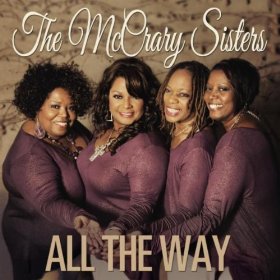 19. ALL THE WAY, The McCrary Sisters (McCrary Sisters Productions)– When it comes to the McCrary Sisters, old school does not mean old fashioned. The horn-infused, southern soul and funk arrangements on the Nashville-born and -based siblings’ fine new album, All the Way, may evoke the ‘60s and ‘70s glory days of those genres’ classic eras, but gospel is at the root of it all. The result is music is real and truthful in a way, say, Daft Punk’s never will be. Given too that some of the original testimonials on All the Way are born of cataclysmic personal events, it’s hard to imagine the sisters’ moving messages framed in any other style than those heard here. Their gathered voices, well supported by a tight, supple band and exquisite arrangements that are big when they need to be and restrained when the occasion demands a quieter approach, reveal nothing so much as women with spiritual backbone, unwavering grace, and great big hearts. Follow this link to the Deep Roots review of All The Way.
19. ALL THE WAY, The McCrary Sisters (McCrary Sisters Productions)– When it comes to the McCrary Sisters, old school does not mean old fashioned. The horn-infused, southern soul and funk arrangements on the Nashville-born and -based siblings’ fine new album, All the Way, may evoke the ‘60s and ‘70s glory days of those genres’ classic eras, but gospel is at the root of it all. The result is music is real and truthful in a way, say, Daft Punk’s never will be. Given too that some of the original testimonials on All the Way are born of cataclysmic personal events, it’s hard to imagine the sisters’ moving messages framed in any other style than those heard here. Their gathered voices, well supported by a tight, supple band and exquisite arrangements that are big when they need to be and restrained when the occasion demands a quieter approach, reveal nothing so much as women with spiritual backbone, unwavering grace, and great big hearts. Follow this link to the Deep Roots review of All The Way.
The McCrary Sisters on Music City Roots, from the Loveless Café in Nashville, March 6, 2013, perform ‘Train’ from their new album, All the Way
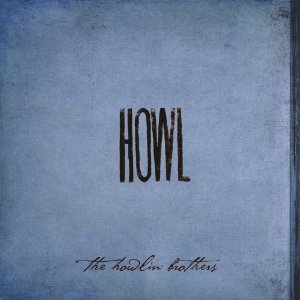 20. HOWL, Howlin Brothers (Readymade Records)– Although the hirsute trio known as the Howlin Brothers looks like they should be starring on The History Channel series Mountain Men and opining about how they “fend off nature’s ceaseless onslaught, carving out lives they’ve chosen from a harsh and unforgiving landscape” (as the Mountain Men website says), in fact Ian Craft (banjo, fiddle), Jared Green (guitar, harmonica) and Ben Plasse (upright bass, banjo) hail from modest circumstances in the Midwest and northeastern parts of the country and met while studying music at the State University of New York in Ithica, NY (Craft studied percussion performance; as classical guitar students Green and Plasse were taught by Pablo Coen). They bonded not over classical but roots music, but at first were a rock band—until, Craft said in an interview for South by Southwest, “we realized acoustic music was what we loved the best. We just had so much fun doin’ it.” Based on Howl, the fellows’ fifth album (including a live album, Time All the Time, released last year), they’re “doin’ it” about as well as anyone else around. Follow this link to the Deep Roots review of Howl.
20. HOWL, Howlin Brothers (Readymade Records)– Although the hirsute trio known as the Howlin Brothers looks like they should be starring on The History Channel series Mountain Men and opining about how they “fend off nature’s ceaseless onslaught, carving out lives they’ve chosen from a harsh and unforgiving landscape” (as the Mountain Men website says), in fact Ian Craft (banjo, fiddle), Jared Green (guitar, harmonica) and Ben Plasse (upright bass, banjo) hail from modest circumstances in the Midwest and northeastern parts of the country and met while studying music at the State University of New York in Ithica, NY (Craft studied percussion performance; as classical guitar students Green and Plasse were taught by Pablo Coen). They bonded not over classical but roots music, but at first were a rock band—until, Craft said in an interview for South by Southwest, “we realized acoustic music was what we loved the best. We just had so much fun doin’ it.” Based on Howl, the fellows’ fifth album (including a live album, Time All the Time, released last year), they’re “doin’ it” about as well as anyone else around. Follow this link to the Deep Roots review of Howl.
[spacer height=”20px”]
http://www.youtube.com/watch?v=BtQeWypigAA
The Howlin’ Brothers’ ‘Big Time,’ a co-write with Warren Haynes, is the first track on the band’s new Brendan Benson-produced album, Howl.
 21. COTTON MOUTH MAN, James Cotton (Alligator)–The once-robust singing voice of James Cotton has been all but silenced by throat cancer in recent years, but his full-bodied harmonica blasts have joyously survived unscathed to record and tour anew. Case in point: Cotton Mouth Man, the followup to his Grammy-nominated 2010 Alligator set Giant. The real auteur of the disc is producer Tom Hambridge, the man behind Buddy Guy’s recent album Living Proof. Recording in Nashville, Hambridge co-wrote every song on the set save one, variously collaborating with Gary Nicholson, Delbert McClinton, Richard Fleming, and Cotton himself (Hambridge plays drums on all but two tracks to boot). “Mississippi Mud,” “He Was There,” and the title track either chronicle events throughout Cotton’s career or reference him directly, tastily accentuated by their subject’s own heavily amplified harmonica. Follow this link to Bill Dahl’s review of Cotton Mouth Man.
21. COTTON MOUTH MAN, James Cotton (Alligator)–The once-robust singing voice of James Cotton has been all but silenced by throat cancer in recent years, but his full-bodied harmonica blasts have joyously survived unscathed to record and tour anew. Case in point: Cotton Mouth Man, the followup to his Grammy-nominated 2010 Alligator set Giant. The real auteur of the disc is producer Tom Hambridge, the man behind Buddy Guy’s recent album Living Proof. Recording in Nashville, Hambridge co-wrote every song on the set save one, variously collaborating with Gary Nicholson, Delbert McClinton, Richard Fleming, and Cotton himself (Hambridge plays drums on all but two tracks to boot). “Mississippi Mud,” “He Was There,” and the title track either chronicle events throughout Cotton’s career or reference him directly, tastily accentuated by their subject’s own heavily amplified harmonica. Follow this link to Bill Dahl’s review of Cotton Mouth Man.
[spacer height=”20px”]
From James Cotton’s Cotton Mouth Man, ‘Wasn’t My Time to Go’ with lead vocal by Keb’ Mo’
 22. THE LAKE REFLECTIONS, Boyd Lee Dunlop (Mr. B. Sharp Records)– Less than a minute into The Lake Reflections, Boyd Lee Dunlop’s beautiful new album of solo piano works, a snippet of the pop classic “Deep Purple” emerges from the artist’s “Scattered Showers.” This contemplative tune is largely defined by Dunlop’s interpolation of other songs—a passage from Liszt’s “Leibesträume” is central to the composition’s evocative denouement—but that “Deep Purple” quote is interesting, because, apart from some witty alterations the pianist makes in the melody line, its opening lyric reads, in part, “in the mist of a memory, you wander back to me/Breathing my name with a sigh…” Of course you have to know the lyrics, because Dunlop doesn’t sing on the album, but if you’ve made it five songs into The Lake Reflections to arrive at “Scattered Showers,” the “Deep Purple” appropriation should strike you as revelational, because the whole album seems to exist in the mist of a memory that breathes Dunlop’s name with a sigh. Dunlop’s fascinating backstory is that he was discovered in a Buffalo nursing home last year. Although a virtuoso pianist, he was virtually unknown—his only two recordings had been as a sideman for saxophonist Moe Koffman in 1948 and on three 1953 sides for legendary R&B sax showman Big Jay McNeeley—save for his work around Buffalo nightclubs following his shift at Bethlehem Steel and in various nightspots he played in around the country when he chucked his steelworker’s job and went pro with the music. (Boyd Lee Dunlop passed away this past December.) Follow this link for the Deep Roots review of The Lake Reflections.
22. THE LAKE REFLECTIONS, Boyd Lee Dunlop (Mr. B. Sharp Records)– Less than a minute into The Lake Reflections, Boyd Lee Dunlop’s beautiful new album of solo piano works, a snippet of the pop classic “Deep Purple” emerges from the artist’s “Scattered Showers.” This contemplative tune is largely defined by Dunlop’s interpolation of other songs—a passage from Liszt’s “Leibesträume” is central to the composition’s evocative denouement—but that “Deep Purple” quote is interesting, because, apart from some witty alterations the pianist makes in the melody line, its opening lyric reads, in part, “in the mist of a memory, you wander back to me/Breathing my name with a sigh…” Of course you have to know the lyrics, because Dunlop doesn’t sing on the album, but if you’ve made it five songs into The Lake Reflections to arrive at “Scattered Showers,” the “Deep Purple” appropriation should strike you as revelational, because the whole album seems to exist in the mist of a memory that breathes Dunlop’s name with a sigh. Dunlop’s fascinating backstory is that he was discovered in a Buffalo nursing home last year. Although a virtuoso pianist, he was virtually unknown—his only two recordings had been as a sideman for saxophonist Moe Koffman in 1948 and on three 1953 sides for legendary R&B sax showman Big Jay McNeeley—save for his work around Buffalo nightclubs following his shift at Bethlehem Steel and in various nightspots he played in around the country when he chucked his steelworker’s job and went pro with the music. (Boyd Lee Dunlop passed away this past December.) Follow this link for the Deep Roots review of The Lake Reflections.
Boyd Lee Dunlop, live at Asbury Hall, Buffalo, NY, January 20, 2013, performing for the CD release of The Lake Reflections, his second album.
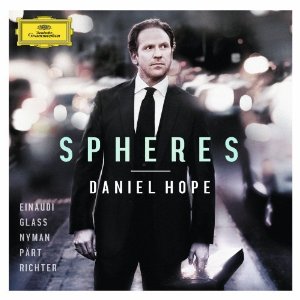 23. SPHERES, Daniel Hope, Berlin Chamber Orchestra (Deutsche Grammophon)— The idea that the universe can aspire to elegance, harmony and symmetry has long been an irresistible concept for artists, musicians and even some scientists. Indeed, last month, the American Association for the Advancement of Science devoted its annual conference to the theme of “The Beauty and Benefits of Science,” in which speakers explored the historical roots of this idea, and how it’s applied today. It’s a controversial notion, of course, suggesting that subjective aesthetics can be applied to an inherently objective discipline. But flip the concept around, and you get projects like Spheres, the thought-provoking album by the British violinist Daniel Hope. The collection is based on “music of the spheres,” the philosophical idea that the proportions of the movements of celestial bodies–the sun, moon and planets–can be viewed in the form of music, inaudible but perfectly harmonious. Hope has assembled a collection of 18 pieces whose repetitions evoke the recurrent orbits of astral bodies. Follow this link to the Deep Roots review of Spheres.
23. SPHERES, Daniel Hope, Berlin Chamber Orchestra (Deutsche Grammophon)— The idea that the universe can aspire to elegance, harmony and symmetry has long been an irresistible concept for artists, musicians and even some scientists. Indeed, last month, the American Association for the Advancement of Science devoted its annual conference to the theme of “The Beauty and Benefits of Science,” in which speakers explored the historical roots of this idea, and how it’s applied today. It’s a controversial notion, of course, suggesting that subjective aesthetics can be applied to an inherently objective discipline. But flip the concept around, and you get projects like Spheres, the thought-provoking album by the British violinist Daniel Hope. The collection is based on “music of the spheres,” the philosophical idea that the proportions of the movements of celestial bodies–the sun, moon and planets–can be viewed in the form of music, inaudible but perfectly harmonious. Hope has assembled a collection of 18 pieces whose repetitions evoke the recurrent orbits of astral bodies. Follow this link to the Deep Roots review of Spheres.
[spacer height=”20px”]
Daniel Hope performs ‘Musical Universalis’ (by Alex Baranowski) from his album Spheres.
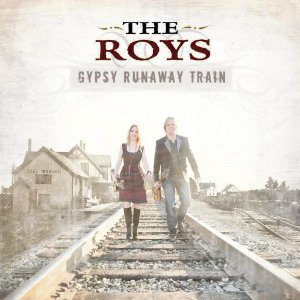 24. GYPSY RUNAWAY TRAIN, The Roys (Rural Rhythm)– The title track of The Roys’ new album closes out the long player on a jubilant note, with an eager vocal from Lee Roy enthusiastic harmonizing from Elaine Roy, aided by some hot pickin’ (Randy Kohrs is on dobro—need any more be said?) and fiddlin’ (Clint White), and it’s the rare musician-on-the-road song that doesn’t speak of the draining travel, bad food and dodgy lodging. Written by Lee Roy with Morry Trent, it speaks of musicians embracing the troubadour’s life “because music’s in our blood,” and adds, “we can’t stay too long but we’ll hope you’ll have us back/our jobs ain’t done if you ain’t wantin’ more.” If The Roys’ 2011 Lonesome Whistle debut and 2012 EP New Day Dawning proved anything, it was that these gifted siblings thoroughly enjoy making music on and off the road. But “Gypsy Runaway Train,” as pleasant a toe-tapper as it is, is the least of the new album’s original and cover songs. This is true for the simple fact that since last we heard from Lee and Elaine, misfortune has dogged them. Elaine and her husband divorced and the resulting upheaval and confusion informs three wrenching songs she wrote for the album, and sings with a palpable ache in her delivery. Lee lost his father-in-law, clearly a giant of a moral man who was the best kind of role model for his family. Lee honors him with “Another Minute,” a sweet, melancholy bluegrass ballad with a loping rhythm. Follow this link to the Deep Roots review of Gypsy Runaway Train.
24. GYPSY RUNAWAY TRAIN, The Roys (Rural Rhythm)– The title track of The Roys’ new album closes out the long player on a jubilant note, with an eager vocal from Lee Roy enthusiastic harmonizing from Elaine Roy, aided by some hot pickin’ (Randy Kohrs is on dobro—need any more be said?) and fiddlin’ (Clint White), and it’s the rare musician-on-the-road song that doesn’t speak of the draining travel, bad food and dodgy lodging. Written by Lee Roy with Morry Trent, it speaks of musicians embracing the troubadour’s life “because music’s in our blood,” and adds, “we can’t stay too long but we’ll hope you’ll have us back/our jobs ain’t done if you ain’t wantin’ more.” If The Roys’ 2011 Lonesome Whistle debut and 2012 EP New Day Dawning proved anything, it was that these gifted siblings thoroughly enjoy making music on and off the road. But “Gypsy Runaway Train,” as pleasant a toe-tapper as it is, is the least of the new album’s original and cover songs. This is true for the simple fact that since last we heard from Lee and Elaine, misfortune has dogged them. Elaine and her husband divorced and the resulting upheaval and confusion informs three wrenching songs she wrote for the album, and sings with a palpable ache in her delivery. Lee lost his father-in-law, clearly a giant of a moral man who was the best kind of role model for his family. Lee honors him with “Another Minute,” a sweet, melancholy bluegrass ballad with a loping rhythm. Follow this link to the Deep Roots review of Gypsy Runaway Train.
Lee Roy’s tribute to his late father-in-law, ‘Another Minute,’ from Gypsy Runaway Train
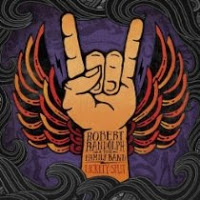 25. LICKETY SPLIT, Robert Randolph and the Family Band (Blue Note)–The pedal steel guitar is an instrument with many emotions and no fear expressing any of them. For example, it can cry briny tears, spit in indignant frustration, and lift its voice in joyous celebration. It’s the latter emotion that the steel guitar expresses on Lickety Split, Robert Randolph and the Family Band’s first album in three years. While the twelve tracks cover a wide swath of popular sounds, the constant is the chirping, squealing, shouting steel guitar that has propelled Randolph to status as one of the instrument’s most revered performers. Carlos Santana joins the group on “Blacky Joe,” and on “Brand New Wayo,” he sears the Meters-style funk selection from head to foot with red-hot guitar licks. The Family Band is nothing if not versatile, shifting from a cover of the Ohio Players’ “Love Rollercoaster” to the swaggering country-rock “All American” to “New Orleans,” a paean to the Big Easy done up in fragrant vocals and musical mojo. Follow this link to the Deep Roots review of Lickety Split.
25. LICKETY SPLIT, Robert Randolph and the Family Band (Blue Note)–The pedal steel guitar is an instrument with many emotions and no fear expressing any of them. For example, it can cry briny tears, spit in indignant frustration, and lift its voice in joyous celebration. It’s the latter emotion that the steel guitar expresses on Lickety Split, Robert Randolph and the Family Band’s first album in three years. While the twelve tracks cover a wide swath of popular sounds, the constant is the chirping, squealing, shouting steel guitar that has propelled Randolph to status as one of the instrument’s most revered performers. Carlos Santana joins the group on “Blacky Joe,” and on “Brand New Wayo,” he sears the Meters-style funk selection from head to foot with red-hot guitar licks. The Family Band is nothing if not versatile, shifting from a cover of the Ohio Players’ “Love Rollercoaster” to the swaggering country-rock “All American” to “New Orleans,” a paean to the Big Easy done up in fragrant vocals and musical mojo. Follow this link to the Deep Roots review of Lickety Split.
[spacer height=”20px”]
Robert Randolph & The Family Band, ‘Born Again,’ a live performance of the first single from the new album Lickety Split
Follow this link to Part II of the 2013 Elite Half Hundred



